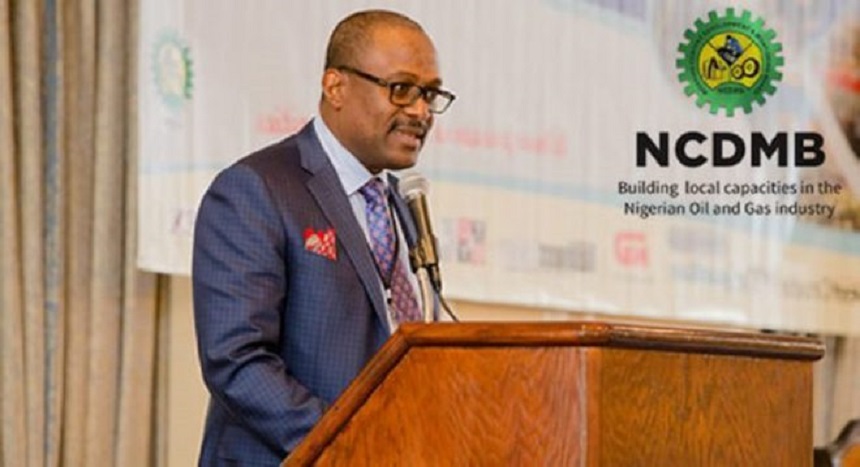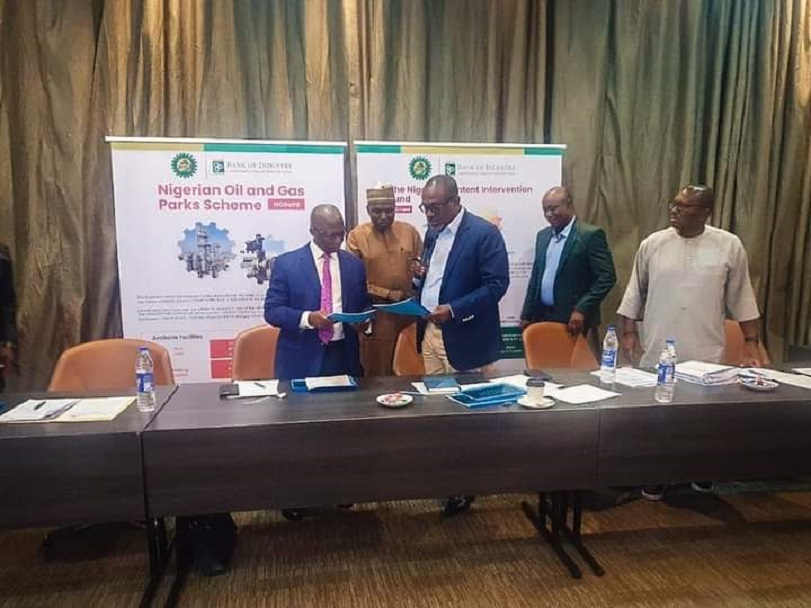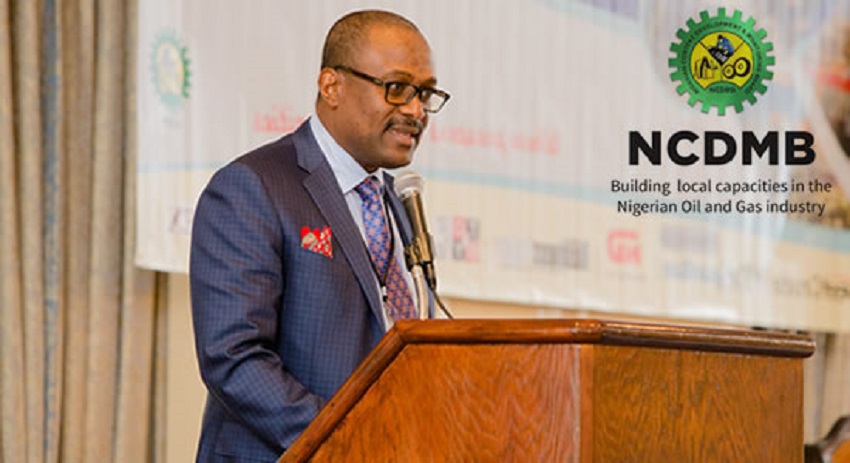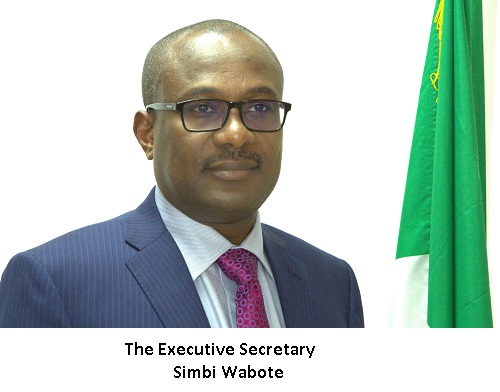General
$5m Bribe: NCDMB Rubbishes Allegation Against Wabote

By Ahmed Rahma
The Nigerian Content Development and Monitoring Board (NCDMB) has defended its Executive Secretary, Mr Simbi Wabote, saying that the $5 million bribery allegation against him is false.
A few days ago, one Mr Jackson Ude had accused Mr Wabote of receiving $5 million bribe from a German company to violate Nigeria’s local content laws on the Bonny Train 7 contract.
The journalist has said, “Simbi Wabote, the Executive Secretary of the Nigeria Content Development and Monitoring Board, a lackey of Timipre Sylva, actually collected $5 million bribe from Kelvion, German company to violate Nigeria’s local content laws on the Bonny Train 7 contract. Details plenty!”
But responding in a statement signed by General Manager of Corporate Communication/Zonal Coordination, NCDMB, Dr Ginah Ginah, the organisation described this allegation as baseless.
“Our attention has been drawn to a spurious and libellous online publication in Pointblank News of 10th February 2021, in which one Jackson Ude, purported that the Executive Secretary of the NCDMB, Engr. Simbi Wabote, and the Minister of State for Petroleum, Chief Timipre Sylva received bribes to undermine the Nigerian content policy in the award of Train 7 EPC contract.
“The report epitomizes a futile attempt to soil the image of public officials who have worked hard to develop local content in the Nigerian oil and gas industry.
“It is apparent that the writer does not even understand the role of NCDMB as enshrined in the Nigerian Oil and Gas Industry Content Development (NOGICD) Act 2010.
“It could have been proper to ignore the fabricated news report, but we have a duty to provide the facts so that unsuspecting members of the public are not misled by blatant disinformation.
“For the avoidance of doubt, the NCDMB is a regulator and does not award contracts in the Nigerian oil and gas industry,” NCDMB explained in the statement.
Explaining further, it stated, “Our involvement in the award process is limited to evaluation of local content requirements in tenders, upon which NCDMB communicates to operators and/or project promoters the outcome of bidders’ compliance or otherwise with the provisions of the NOGICD Act.
“Due consideration and the decision to award a contract to any of the compliant bidders rest with the operator and their partners/ project promoters.
“The process of scaling through local content requirements in a project development is based on the provisions of the Nigerian Content Act and not on a subjective checklist that can be changed at the whims of any individual.”
It revealed that, “Circumventing the rules/requirements attracts stiff sanctions. Therefore, it would have been impossible for the Executive Secretary and the Minister or any other official for that matter to be induced to contravene the provisions of the law they are meant to enforce.
“It would have also been impossible for any official to dictate to the operators or project promoters on their choice of contractors without due regard for the commercial aspects and project economics.
“This fake news by Jackson Ude is a disingenuous attempt to diminish the hard work that engendered the Final Investment Decision (FID) for NLNG Train 7 project even at the peak of the COVID-19 pandemic last year.
“The allegations are not only reckless but also calls to question the motive of Mr. Ude and his cohorts as the country strives to attract investors and create job opportunities for Nigerians.
“Just to call a spade a spade: the report by Jackson Ude is completely FALSE and makes no sense; it is mere FAKE news that satisfies only the author’s mischief and the selfish interests of his sponsors.
“It is on record that the outcome of the Train-7 Project tenders provided very significant financial savings for the NLNG and the country at large.
“We will therefore not succumb to any mudslinging or blackmail from Jackson Ude or his cohorts, including those business promoters who did not win the NLNG Train-7 contracts but have decided to vent their spleen through channels of disinformation such as the online Pointblank News
“Since creation in 2010, the NCDMB has worked to achieve quantum growth in the Nigerian oil and gas industry from less than 5% to over 35%.
“The in-country capacities and capabilities developed over the years are evident and we will not be distracted from our focus and plan to increase this to 70 percent by 2027 in line with our extant 10-year Strategic Roadmap.”
General
Deep Blue Project: Mobereola Seeks Air Force Support

By Adedapo Adesanya
The Director General of the Nigerian Maritime Administration and Safety Agency (NIMASA), Mr Dayo Mobereola, is seeking enhanced cooperation between the agency and the Nigerian Air Force (NAF) with the aim of strengthening tactical air support within the Deep Blue project.
During a courtesy visit last week, Mr Mobereola told the Chief of Air Staff, Air Marshall S. K. Aneke at the NAF Headquarters in Abuja, that the Air Force was a strategic partner in enhancing maritime security in Nigeria and sustaining the momentum of the Deep Blue Project’s success.
According to the DG, “We are here to seek the Air Force’s support, given the importance of tactical air surveillance to the Deep Blue Project. Nigeria is the only African country with a record of zero piracy within the last 4 years. The Deep Blue Project platforms have been used to achieve zero piracy and sea robberies in the Gulf of Guinea, and we need your collaboration to sustain this momentum”.
He further emphasised that international trade depends on security, which is why vessels prefer to go to or transit through countries where they are secured. “With the traffic we have now, we need to show more security might through collaboration to strengthen our trade viability because of the risks attached to our route. We need these collaborations to sustain what we have achieved so far with the Deep Blue Project”.
The NIMASA DG expressed hope that the collaboration with the Nigeria Air Force will reduce response time.
On his part, the Chief of Air Staff, Air Marshall S.K. Aneke, noted that the Air Force desires to be “a very supportive and collaborative partner with NIMASA and is ready to match the Agency step by step and side by side to achieve the desired results.”
He noted that “collaboration between NIMASA and the Nigerian Air Force under the Deep Blue Project can be strengthened through a joint strategic framework, integrated command structures, and a standing steering committee to ensure shared objectives and accountability.
“Establishing a joint maritime domain awareness fusion cell will enable real-time intelligence sharing, synchronised surveillance, and faster response to maritime threats and ensure sustained operational effectiveness across Nigeria’s territorial waters and exclusive economic zone,” he said, according to a statement.
The Air Force Chief added that the Air Force can also support NIMASA outside the Deep Blue Project operations by providing its own ISR platforms, tactical air support, and rapid airborne deployment for interdictions and search and rescue missions.
While thanking the NIMASA DG for the basic trainings the Agency has provided the aircraft pilots under the Deep Blue Project, Air Marshall Aneke also highlighted areas of operational challenges needing NIMASA’s attention to include bridging the communication gap between NAF operators and NIMASA, higher level and in-depth maintenance trainings, readily available fueling of aircrafts to avoid delays on missions, and provision of flying kits among others.
He therefore pledged the Air Force’s collaboration and assured that the request by NIMASA has been noted and that things will begin to move at thrice its speed going forward.
General
Nigeria’s Democracy Suffocating Under Tinubu—Atiku

By Modupe Gbadeyanka
Former Vice President, Mr Atiku Abubakar, has lambasted the administration of President Bola Tinubu for the turnout at the FCT Area Council elections held last Saturday.
In a statement signed by his Media Office, the Adamawa-born politician claimed that the health of Nigeria’s democracy under the current administration was under threat.
According to him, “When citizens lose faith that their votes matter, democracy begins to die. What we are witnessing is not mere voter apathy. It is a direct consequence of an administration that governs with a chokehold on pluralism. Democracy in Nigeria is being suffocated slowly, steadily, and dangerously.”
He warned that the steady erosion of participatory governance, if left unchecked, could inflict irreversible damage on the democratic fabric painstakingly built over decades.
“A democracy without vibrant opposition, without free political competition, and without public confidence is democracy in name only. If this chokehold is not released, history will record this era as the period when our hard-won freedoms were traded for fear and conformity,” he stressed.
Mr Atiku said the turnout for the poll was below 20 per cent, with the Abuja Municipal Area Council (AMAC) recording 7.8 per cent.
He noted that such civic participation in the nation’s capital, the symbolic heartbeat of the federation, is not accidental, as it is the predictable outcome of a political environment poisoned by intolerance, intimidation, and the systematic weakening of opposition voices.
The presidential candidate of the People’s Democratic Party (PDP) in the 2023 general elections stated that the ruling All Progressives Congress (APC) under Mr Tinubu has pursued a deliberate policy of shrinking democratic space, harassing dissenters, coercing defectors, and fostering a climate where alternative political viewpoints are treated as threats rather than contributions to national development.
He called on opposition parties and democratic forces across the country to urgently close ranks and forge a united front, declaring, “This is no longer about party lines; it is about preserving the Republic. The time to stand together to rescue and rebuild Nigeria is now.”
General
Nigeria Eyes Full Entry into Council of Palm Oil Producing Countries

By Adedapo Adesanya
Nigeria is set to validate a technical committee report geared towards transitioning the country from observer status to full membership of the Council of Palm Oil Producing Countries (CPOPC) in April.
Mr Abubakar Kyari, Minister of Agriculture and Food Security, said this when the council’s mission visited him over the weekend in Abuja, noting that the ministry had constituted a technical committee to consider how the country would seamlessly transit from observer country to membership in CPOPC based on its strategic importance in palm oil production.
“We are conscious of the fact that the palm oil value chain is very strategic for us and identified it as an export crop that can drive foreign exchange for the country and ensure good health in terms of consumption.
“We are conscious of the fact that we need the support of CPOPC countries to provide the country with a new variety of seeds that are climate-smart and resistant so that they can be produced by farmers in the country,” he said.
Mr Alphonsus Inyang, President, National Palm Produce Association of Nigeria (NPPAN), said being a member of CPOPC Nigeria would target over 10 million tonnes of oil palm between 2026 and 2050.
“We are also targeting 2.5 million hectares from among Nigeria households who are out to produce one hectare each, geared towards a N20 trillion annual economy within this period from among Nigeria households.
“We are working side by side with the big players who will be developing plantations,” he said.
The Secretary-General of CPOPC, Ms Izzana Salleh, said the council’s mission to Nigeria was to see how the country could transit from observer status to full membership, among others
She said that the status of the country as an observer nation since 2024 would expire by November.
Ms Salleh assured the country of the council’s readiness to support its vision to strengthen domestic production, enhance food security and build a competitive and sustainable palm oil supply chain.
The official emphasised that being a member of the council would strategically position Nigeria for a greater future regarding oil palm production.
According to her, the visit is to strengthen the council’s engagement with Nigeria, including potential membership in CPOPC.
She said: “The council’s mission to Nigeria aims to advance both Nigeria’s national ambitions and Africa’s collective voice in global agricultural discussions.
“CPOPC was established to promote cooperation among producing nations, empower smallholders, advance sustainability, and ensure fair, science-based global dialogue on vegetable oils.
She emphasised that being a member of the council would strategically position the country for greater future prospects regarding oil palm production and the value chain, as well as export.
“We are ready to support Nigeria’s vision to strengthen domestic production, enhance food security, and build a competitive and sustainable palm oil supply chain,” she said.
-

 Feature/OPED6 years ago
Feature/OPED6 years agoDavos was Different this year
-
Travel/Tourism10 years ago
Lagos Seals Western Lodge Hotel In Ikorodu
-

 Showbiz3 years ago
Showbiz3 years agoEstranged Lover Releases Videos of Empress Njamah Bathing
-

 Banking8 years ago
Banking8 years agoSort Codes of GTBank Branches in Nigeria
-

 Economy3 years ago
Economy3 years agoSubsidy Removal: CNG at N130 Per Litre Cheaper Than Petrol—IPMAN
-

 Banking3 years ago
Banking3 years agoSort Codes of UBA Branches in Nigeria
-

 Banking3 years ago
Banking3 years agoFirst Bank Announces Planned Downtime
-

 Sports3 years ago
Sports3 years agoHighest Paid Nigerian Footballer – How Much Do Nigerian Footballers Earn
















